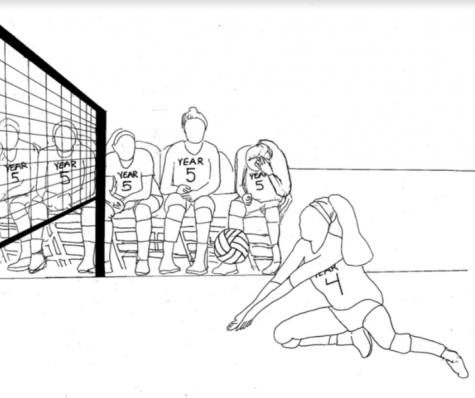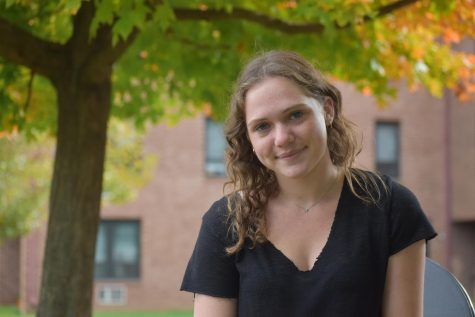I repeated tenth grade, now I can’t compete in sports
December 3, 2019

Fifth-year students are sidelined on the bench of a volleyball game, while a fourth year student participates in the competition. Fifth-year athletes are not allowed to play in league competition, regardless of their skill level and capability.
While I knew the decision to repeat my sophomore year would change my social and educational spheres, I had no idea that it would prevent me from participating in school sports teams.
Mid-way through this year’s fall season, I learned that I would not be eligible to participate in sports for my senior year on account of being a repeat student. I repeated my sophomore year of high school when I transferred to Masters for educational reasons, but the transition was made easier since I was one of the youngest students in my class at Scarsdale High School (SHS).
In previous years, Masters was a member of the New England Preparatory School Athletic Conference (NEPSAC), which allowed fifth-year students to play on their school teams as postgraduates. Masters ultimately chose to switch leagues for a variety of reasons, primarily because of the long distances to and from competition.
The regulation that limits students’ athletic eligibility is imposed by The New York State Association of Independent Schools (NYSAIS), the organization that now oversees all aspects of Masters’ scholastic competition and sports.
The NYSAIS handbook states, “A pupil shall be eligible for senior high school athletic competition in a sport during each of four consecutive seasons of such sport commencing with the pupil’s entry into the ninth grade and prior to graduation…” Essentially, anyone who has repeated a grade in high school, making them a “fifth year senior,” is ineligible to compete in their final year of high school.
This regulation has a fatal flaw in that it inhibits certain students from engaging in the sports they love.
The main goal of the age and eligibility mandate is to prevent redshirting–the practice of holding a child back for the purpose of gaining strength and size advantages–for athletic purposes. The unfair advantage that a school team can gain from having a fifth-year student can be monumental, and can cause unlevel playing fields.
The inequitable consequences of having fifth-year players skews the successes of teams. Masters’ Athletic Director Logan Condon said, “It’s another year of eligibility, competition and maturity. If you have a 13 or 14 year-old freshman going against that 19 year-old post graduate, it can be a vastly different situation.”
This rule exists to maintain the integrity of the leagues and a balanced level of skill and capability. Condon explained, “I appreciate why the rule is so black and white to keep from those who are trying to gain a competitive advantage. I do sympathize with individuals who really just want to be a part of a team, and are not using it as a competitive advantage, but as a vehicle to have a wonderful experience.”
A school with a 5th year player is only eligible for NYSAISAA tournaments in sports other than the one with the fifth year player. Because of potential liability, Heads of School must approve competitions. Any Head of School with a fifth year senior is required to seek approval from other NYSAIS Heads prior to competition involving a fifth year player
This objectives of this rule are justifiable and make sense, but it is unintentionally also targeting a group of students who would not provide their teams with significant advantages and just want to be a part of the athletic community.
The fact that I am not allowed to play next season baffles me. I did not play any sports for school in either of my years at SHS, nor did I practice them competitively outside of school. Now that I’ve found my passion and friends on the varsity tennis team, this rule stands in the way of my continued enjoyment of the sport.
The rule is especially harmful to international students who are either repeat students or are older than 18, the maximum age of eligibility. Junior Stellar “Noon” Son, has repeated two and a half years of school, one of the years being here at Masters, while the other year and a half were in China. Son, currently 19 years-old is prohibited from playing for Masters’ teams.
Once a three-season athlete, Son developed an avid regard for softball, fencing, and volleyball. “I think it is really sad that people who are really passionate about sports and are willing to devote their time to their teams cannot participate just because of a NYSAIS rule.” Son continued, “I see a lot of students meet new people as they play sports. You can meet new people in clubs and co-curriculars, but sports is different because you actually do need to work with each other to gain teamwork skills and communicate with each other.”
Through it all, Son’s affinity for her team remains evident, and her inability to participate does not hold her back from doing what she loves. “I will still practice with teams regardless of NYSAIS regulations. If your really passionate about playing sports, the regulations should not hold you back. You don’t need to participate in the game to show you love sports,” Son said.
By not allowing this select group of students to take part in contests, we are losing the camaraderie of playing for a team in our senior (or junior) year. The tight-knit nature of teams and school spirit are weakened by every player who is no longer allowed to partake in matches.
In such a diverse and unique community, our teams are a crucial tool for bringing together students across all ages, grades and genders. Masters’ sports teams foster an incredible sense of leadership and support, so being unable to participate will undoubtedly take away from a student’s experience at Masters.
Like Son, I plan on being with my team every step of the way, whether that means managing or just practicing with them on the courts. Even though NYSAIS rules state I cannot play in official matches, they cannot stop me from being a part of the team.




Crews • Aug 2, 2021 at 2:35 PM
I don’t understand this rule at all I’m fairly young for my grade and regarding i can’t get held back in high school because I’ll be ineligible for basketball is truly unfair when most people get held back in middle school why can’t you get held back in high school and regarding you can’t is a hudge disadvantage for those that are younger for there grade there should be at least some rule that allows the younger students to repeat a sport based on there age. I just passed the deadline for me to be a grade ahead and I started school early there should not be a difference between getting held back in middle school and high school this is truly unfair and a disadvantage for the younger kids and that are serious about playing basketball and developing their craft I hope this is fixed!!!